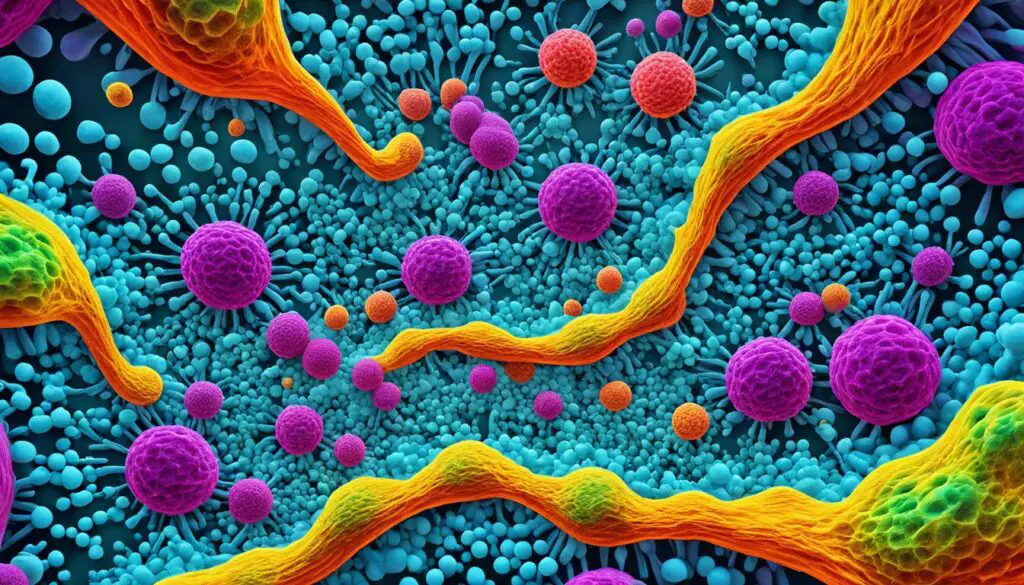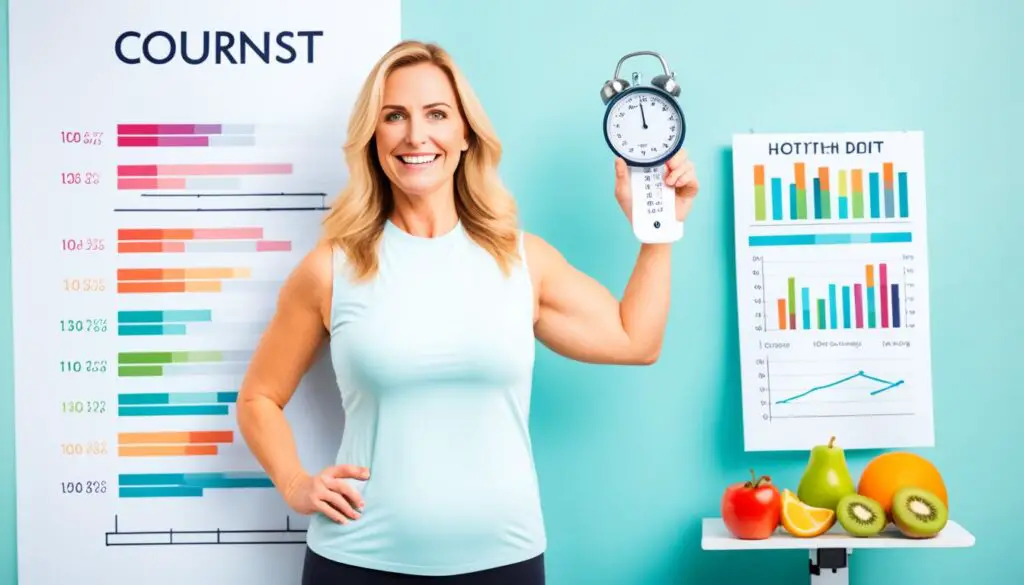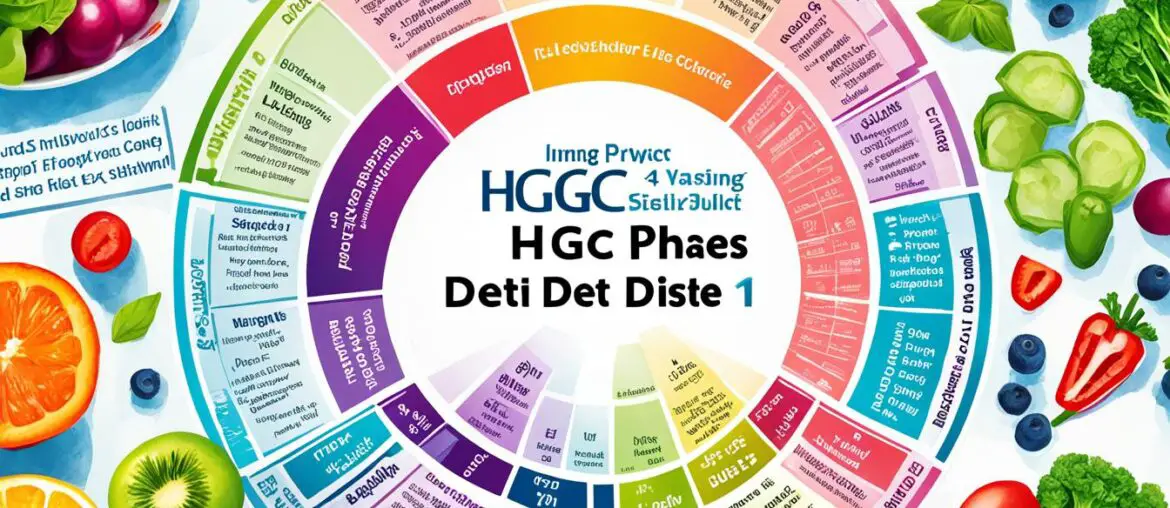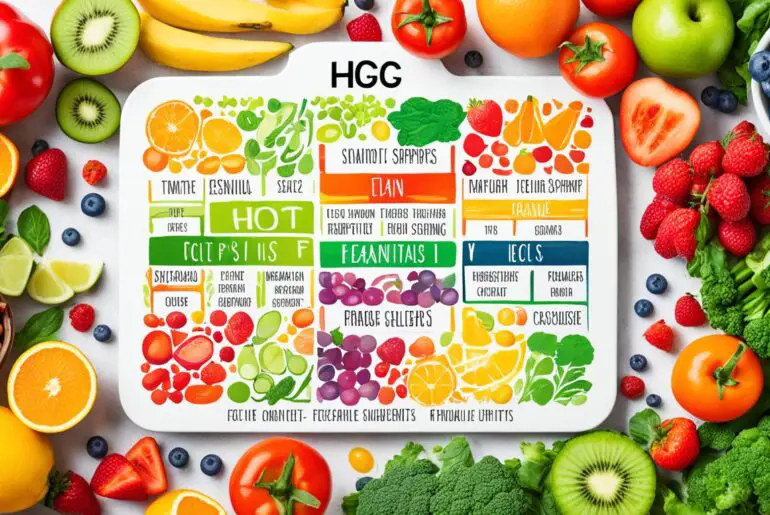Did you know that the HCG diet protocol has been gaining popularity as a weight loss solution? This unique diet combines the use of HCG hormone supplements with a low-calorie eating plan, providing a structured approach to shedding those extra pounds. If you’re considering trying the HCG diet plan or are curious about its effectiveness, let’s dive into the details and explore the step-by-step guide to navigating this protocol.
Key Takeaways:
- The HCG diet protocol combines HCG hormone supplements with a low-calorie diet for weight loss.
- The protocol comprises different phases, including a loading phase, a weight loss phase, and a maintenance phase.
- Specific food choices are recommended, such as approved proteins, vegetables, fruits, and grains.
- Setting realistic goals, following the recommended dosage, and staying hydrated are crucial for success.
- Consulting a healthcare professional is essential before starting the HCG diet protocol.
Is the HCG Diet Right for You?
The HCG diet protocol may be a suitable option for individuals who have been struggling to lose weight and are looking for quick results to stay motivated. It can be beneficial for those who have reached a weight loss plateau and want to see progress. The HCG diet can be effective for individuals with a few extra pounds or those who are grossly overweight. It may also be an option for those who dislike exercise and want to lose weight rapidly. However, it is important to consult a healthcare professional before starting the HCG diet and to understand that weight loss on the protocol is due to calorie restriction rather than the HCG hormone itself.
To determine whether the HCG diet is right for you, consider the following factors:
- Weight Loss Plateau: If you have been struggling to lose weight and have hit a plateau, the HCG diet might provide the boost you need to break through and continue seeing progress.
- Goal Weight: The HCG diet can be effective for individuals with a few extra pounds or those who are significantly overweight. Set realistic weight loss goals to stay motivated throughout your journey.
- Exercise Preferences: If you dislike exercise or have physical limitations that prevent you from engaging in vigorous workouts, the HCG diet offers a weight loss solution without heavily relying on exercise.
- Commitment to Calorie Restriction: The HCG diet requires strict adherence to a low-calorie diet plan, typically involving 500 to 800 calories per day. Consider whether you are willing and able to commit to this level of calorie restriction.
Remember, the HCG diet should be approached with caution and under the guidance of a healthcare professional. While it can be an effective weight loss option, it may not be suitable for everyone. Consulting a healthcare provider will help ensure that the diet aligns with your specific needs and goals.
Next, let’s explore the key aspects of the HCG hormone and its role in the diet protocol.
Understanding the HCG Hormone

The HCG hormone, also known as human chorionic gonadotropin, is a hormone produced during pregnancy. It was initially used for weight loss because overweight women tended to lose weight during pregnancy. The HCG hormone is administered through injections or sublingual drops and is used in extremely low doses for weight loss.
While the FDA has not approved HCG for weight loss, it is allowed to be used off-label by healthcare providers. HCG has been found to have positive effects on mood, energy levels, back pain, and migraine pain.
It is important to note that HCG can cause a false positive pregnancy test in urine.
Benefits of the HCG Hormone
Although the FDA has not approved HCG for weight loss, many healthcare providers recognize its potential benefits when used under medical supervision. The HCG hormone can play a role in weight loss by promoting fat burning, decreasing hunger, and maintaining muscle mass.
The HCG hormone can be a valuable tool for individuals looking to lose weight, especially when combined with a low-calorie diet and a healthy lifestyle.
Using HCG Injections for Weight Loss
HCG injections are a popular method for delivering the hormone into the body. These injections are typically self-administered or given under the guidance of a healthcare professional. It is important to follow the recommended dosage and injection schedule provided by your healthcare provider to ensure safe and effective weight loss.
- Prepare the injection site by cleaning the area with an alcohol pad.
- Remove the cap from the injection needle and twist it onto the syringe.
- Gently pull back the plunger to fill the syringe with the prescribed amount of HCG hormone.
- Pinch a fold of skin at the injection site and insert the needle at a 90-degree angle.
- Push the plunger down slowly to inject the HCG hormone.
- Remove the needle and apply gentle pressure to the injection site with a cotton ball or sterile gauze.
FDA Approval and the HCG Hormone
Although the FDA has not approved HCG for weight loss, it is important to note that the hormone is approved for other medical purposes, such as the treatment of certain fertility issues. Healthcare providers may prescribe HCG for weight loss as an off-label use, meaning using the medication for a purpose other than what it was originally approved for.
While off-label use is legal and commonly practiced, it is essential to consult with a healthcare provider before starting any weight loss program involving HCG injections. This ensures proper monitoring and guidance throughout the process to ensure safety and effectiveness.
The HCG Diet Plan Phases and Food Choices
https://www.youtube.com/watch?v=6ONdxckrYro
The HCG diet plan is divided into different phases, each serving a specific purpose in achieving weight loss goals. These phases include the loading phase, the weight loss phase, and the maintenance phase. Let’s explore each phase in detail.
1. Loading Phase
The loading phase is the initial stage of the HCG diet plan. During this phase, individuals are encouraged to indulge in high-fat, high-calorie foods for a duration of two days. This might seem counterintuitive, but it prepares the body for the upcoming calorie restriction in the weight loss phase. The excess calories consumed during this phase play a role in boosting metabolism and fat-burning capacity, setting the stage for effective weight loss.
2. Weight Loss Phase
The weight loss phase is the core of the HCG diet plan, where individuals focus on a calorie-restricted diet in combination with HCG hormone supplementation. The calorie intake during this phase is restricted to either 500 or 800 calories per day, depending on the specific variation of the HCG diet plan followed. These calories are divided into two meals, typically lunch and dinner.
It’s essential to adhere strictly to the prescribed calorie limit and meal frequency during this phase. The purpose of such calorie restriction is to create a calorie deficit, forcing the body to utilize stored fat as a source of energy, ultimately leading to weight loss.
When it comes to food choices during the weight loss phase, the HCG diet plan provides a list of approved options. These include lean proteins like chicken breast and white fish, nutritious vegetables like asparagus and broccoli, satisfying fruits like apples and strawberries, and small portions of approved grains such as Melba toast and grissini breadsticks.
3. Maintenance Phase
The maintenance phase is the final stage of the HCG diet plan, where individuals transition from a calorie-restricted diet to a more sustainable and balanced eating pattern. The main objective of this phase is to help individuals maintain their weight loss achievements and develop healthy eating habits for the long term.
The duration of the maintenance phase may vary depending on individual goals and progress, but it typically lasts for three weeks. During this phase, individuals gradually increase their calorie intake while still avoiding certain foods that could trigger weight regain. It is crucial to follow the guidelines provided during this phase to ensure the success of the weight loss journey.
Remember, the HCG diet plan is not just about calorie restriction; it also emphasizes making healthier food choices and establishing a sustainable lifestyle. By adhering to the prescribed phases and food choices of the HCG diet plan, individuals can pave their way towards achieving their weight loss goals.
| Food Group | Examples |
|---|---|
| Lean Proteins | Chicken breast, white fish, shrimp, lean beef |
| Vegetables | Asparagus, broccoli, spinach, cabbage |
| Fruits | Apples, strawberries, oranges, grapefruit |
| Grains | Melba toast, grissini breadsticks |
Tips for a Successful HCG Diet Journey

To have a successful HCG diet journey, I recommend following these tips:
- Set Realistic Goals: It is important to set realistic weight loss goals when embarking on the HCG diet. Sustainable weight loss takes time, so it’s essential to be patient and focus on long-term success.
- Follow Recommended Dosage: Adhering to the recommended dosage of HCG supplements is crucial for the effectiveness of the diet. Take the supplements as instructed by your healthcare provider to optimize weight loss results.
- Stay Hydrated: Drinking an adequate amount of water is essential while on the HCG diet. Aim to stay well-hydrated throughout the day to support your overall health and weight loss efforts.
- Regular Exercise: Incorporating regular exercise into your HCG diet journey can further enhance weight loss. Engage in physical activities that you enjoy, such as walking, swimming, or cycling, to keep your body active and promote calorie burn.
- Monitor Progress: Keep track of your progress to stay motivated and make necessary adjustments. Weigh yourself regularly and take body measurements to see the changes in your body composition.
- Be Mindful of Food Choices: Pay attention to the foods you consume on the HCG diet. Stick to the approved food list and avoid deviating from the recommended choices. This will ensure that you stay within the calorie restrictions and maximize your weight loss potential.
- Manage Stress: Stress can impact your weight loss journey. Find healthy ways to manage stress, such as practicing mindfulness or engaging in relaxation techniques, to support your overall well-being and weight loss goals.
- Stay Consistent: Consistency is key when following the HCG diet. Stick to the protocol and avoid cheating or skipping meals. By staying consistent, you maximize your chances of achieving your desired weight loss results.
- Seek Support: It can be helpful to seek support from others who are also on the HCG diet or have completed it successfully. Join online communities or support groups to share experiences, get advice, and stay motivated throughout your journey.
- Listen to Your Body: Pay attention to your body’s signals and adjust your diet and exercise routine accordingly. Rest when needed, and don’t push yourself too hard. Trust your intuition and make choices that align with your body’s needs.
“Success is the sum of small efforts repeated day in and day out.” – Robert Collier
By following these tips, you can set yourself up for a successful HCG diet journey. Remember that everyone’s experience may vary, and it’s important to consult with a healthcare professional before starting any new diet or weight loss plan.
Conclusion
The HCG diet protocol offers an effective weight loss plan when followed correctly. By understanding the different phases of the HCG diet plan and making the right food choices, individuals can achieve successful weight loss results. However, it is important to remember that the HCG diet should be approached with caution and under the guidance of a healthcare professional, as it may not be suitable for everyone.
Having a post-diet maintenance plan is crucial for maintaining weight loss and preventing a relapse into old habits. This plan should focus on healthy eating, regular exercise, and mindful lifestyle choices. Celebrating successes along the weight loss journey and being patient during plateaus are also key factors in achieving long-term success.
It is important to note that sustainable weight loss takes time, and setting realistic goals is essential. Remember that the goal is not just to lose weight but to improve overall health and well-being. By staying committed, following the recommended dosage of HCG supplements, staying hydrated, and being consistent with healthy habits, individuals can make significant progress with the HCG diet and achieve their weight loss goals.
FAQ
What is the HCG diet protocol and how does it work?
The HCG diet protocol is a weight loss plan that combines the use of HCG hormone supplements with a low-calorie diet. The protocol includes different phases, such as a loading phase, a weight loss phase, and a maintenance phase. The HCG hormone is believed to help with appetite suppression and metabolism boosting when used in conjunction with the low-calorie diet.
Is the HCG diet suitable for everyone?
The HCG diet may be a suitable option for individuals who have been struggling to lose weight and are looking for quick results to stay motivated. It can be beneficial for those who have reached a weight loss plateau and want to see progress. The protocol can be effective for individuals with a few extra pounds or those who are grossly overweight. However, it is important to consult a healthcare professional before starting the HCG diet to ensure it is suitable for your specific needs.
What is the role of the HCG hormone in the diet?
The HCG hormone, also known as human chorionic gonadotropin, is a hormone produced during pregnancy. It was initially used for weight loss because overweight women tended to lose weight during pregnancy. The hormone is administered through injections or sublingual drops and is used in extremely low doses for weight loss. While the FDA has not approved HCG for weight loss, it is allowed to be used off-label by healthcare providers.
What are the phases of the HCG diet plan?
The HCG diet plan is divided into different phases, including a loading phase, a weight loss phase, and a maintenance phase. During the loading phase, individuals are encouraged to eat high-fat, high-calorie foods to prepare their bodies for the calorie restriction in the weight loss phase. The weight loss phase involves consuming either 500 or 800 calories per day, spread over two meals. The maintenance phase focuses on stabilizing weight loss and gradually reintroducing additional food choices.
What foods are allowed on the HCG diet plan?
The HCG diet plan includes specific food choices, such as lean proteins like chicken breast and white fish, approved vegetables like asparagus and broccoli, approved fruits like apples and strawberries, and approved grains like Melba toast and grissini breadsticks. It is important to follow the recommended food choices to ensure the effectiveness of the diet plan.
What are some tips for a successful HCG diet journey?
To have a successful HCG diet journey, it is important to set realistic weight loss goals and understand that sustainable weight loss takes time. It is essential to follow the recommended dosage of HCG supplements and adhere to the low-calorie diet plan. Staying hydrated by drinking water is crucial, and regular exercise can further enhance weight loss efforts. Monitoring progress, managing stress, and seeking support from others are also important for a successful HCG diet journey.
Can I expect long-term weight loss success with the HCG diet?
The HCG diet protocol can be an effective weight loss plan when followed correctly. However, it is important to have a post-diet maintenance plan to maintain weight loss and avoid reverting to old habits. Celebrating successes along the way, being patient with plateaus, and making sustainable lifestyle changes are essential for long-term weight loss success.




